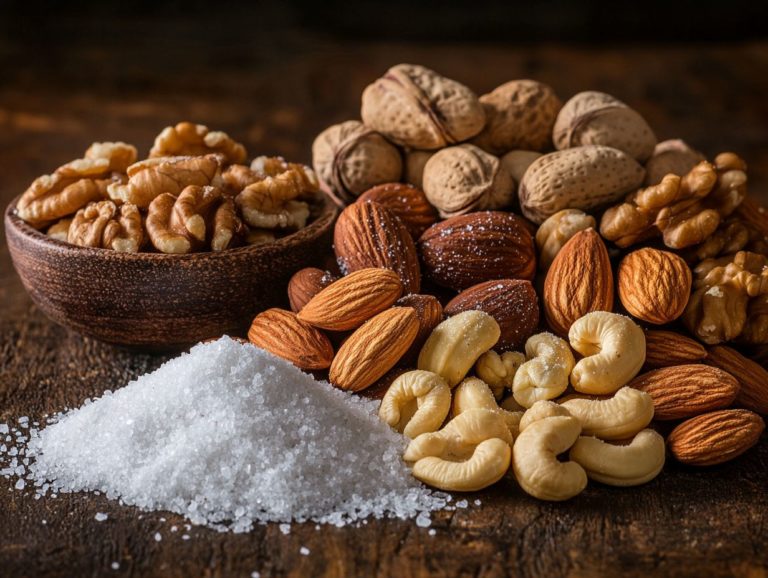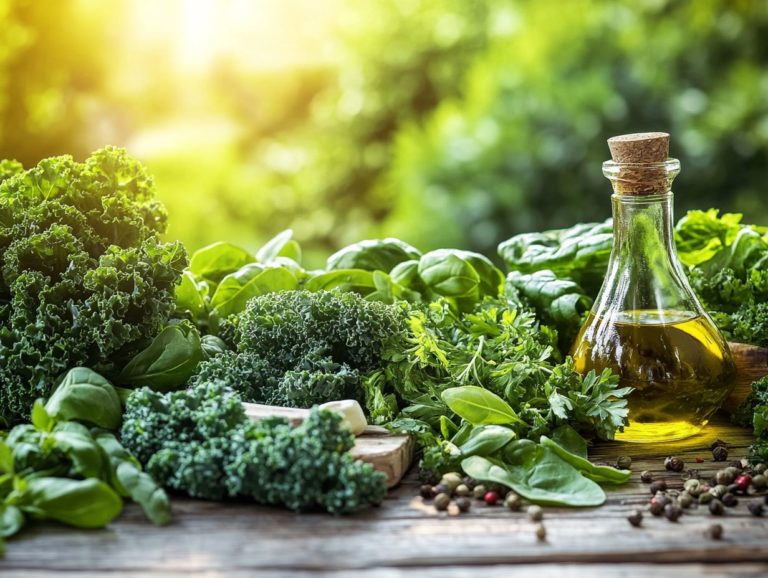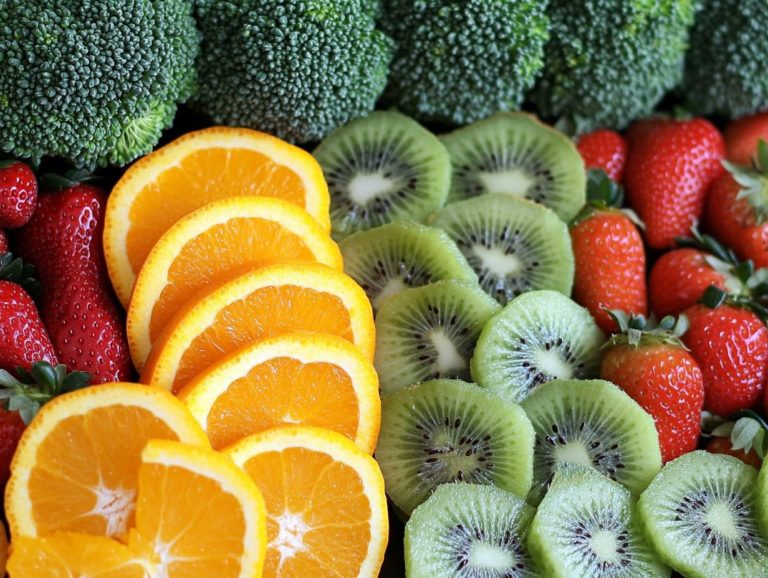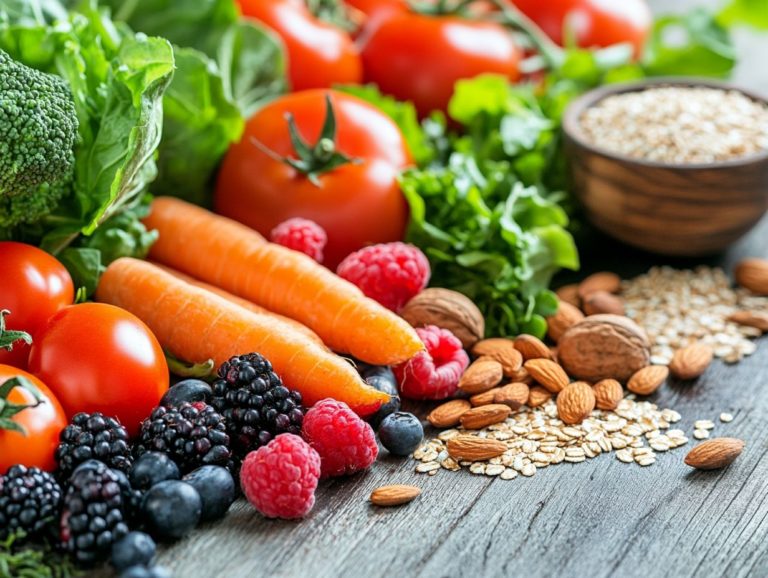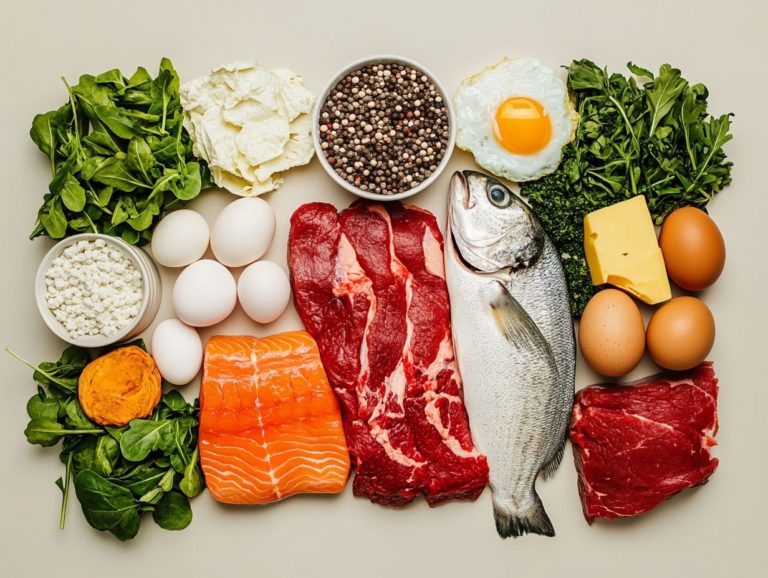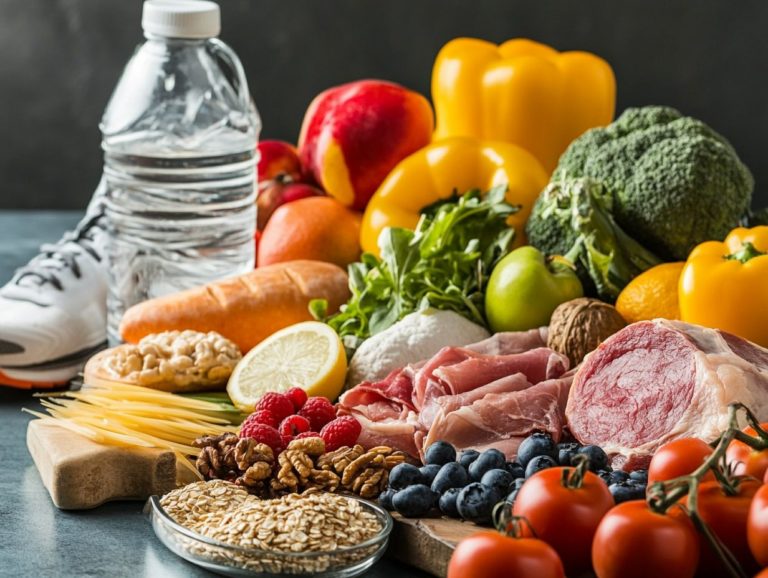Iron-Rich Foods: How to Boost Your Intake
Iron deficiency is a prevalent yet frequently overlooked nutritional concern that can lead to fatigue, weakness, and a variety of other health issues.
Grasping its causes and symptoms is essential for maintaining your overall wellness. This article delves into the critical role iron plays in your body, guiding you through the best iron-rich foods both from animal sources and plant-based options while offering practical tips for enhancing iron absorption.
It also outlines when it might be appropriate to consider supplements and highlights lifestyle changes that can help you prevent deficiency. Embark on this journey toward better health through improved iron intake.
Contents
Key Takeaways:
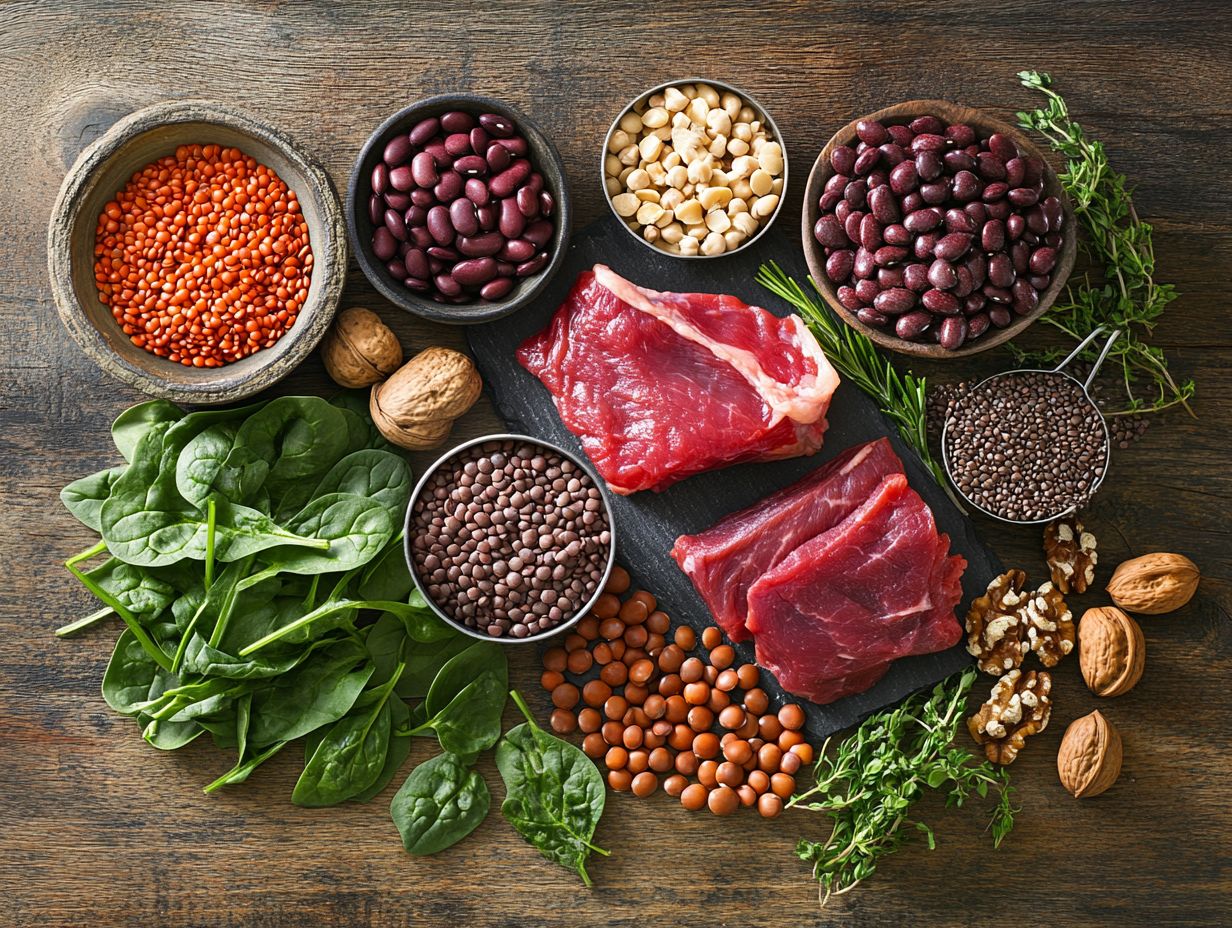
Iron deficiency can cause fatigue, weakness, and other health issues. It is important to understand the causes and symptoms to prevent deficiency.
Iron plays a vital role in carrying oxygen and producing energy in the body. Make sure to include iron-rich foods in your diet for overall health and well-being.
Including meat, seafood, and plant-based sources like legumes and leafy greens in your meals can boost your iron intake. Pairing iron-rich foods with vitamin C can also enhance absorption.
Understanding Iron Deficiency
Iron deficiency is a widespread nutritional concern that impacts millions around the world. It often leads to conditions like iron-deficiency anemia, which hinders the body s ability to produce hemoglobin, a protein in red blood cells that carries oxygen throughout the body.
The Cleveland Clinic highlights that sufficient iron intake is vital for maintaining optimal health, particularly for at-risk groups such as children and pregnant women.
Julia Zumpano underscores the significance of recognizing the causes and symptoms of iron deficiency, enabling you to seek timely intervention and manage your diet appropriately.
Causes and Symptoms
The causes of iron deficiency can vary widely, ranging from insufficient iron intake to heightened iron requirements during growth spurts or pregnancy. Symptoms can include fatigue, weakness, and pale skin, which might be quite concerning.
Poor absorption in the digestive tract can also contribute to this nutritional deficiency, particularly in individuals with conditions like celiac disease or those who’ve undergone specific surgeries. A diet lacking in iron-rich foods such as red meat, legumes, and leafy greens can worsen the situation.
The symptoms linked to iron deficiency can greatly impact your daily life, affecting your energy levels, cognitive function, and overall well-being. Grasping these factors is crucial for tackling anemia head-on and cultivating better nutritional habits.
Why Iron is Your Body’s Best Friend!
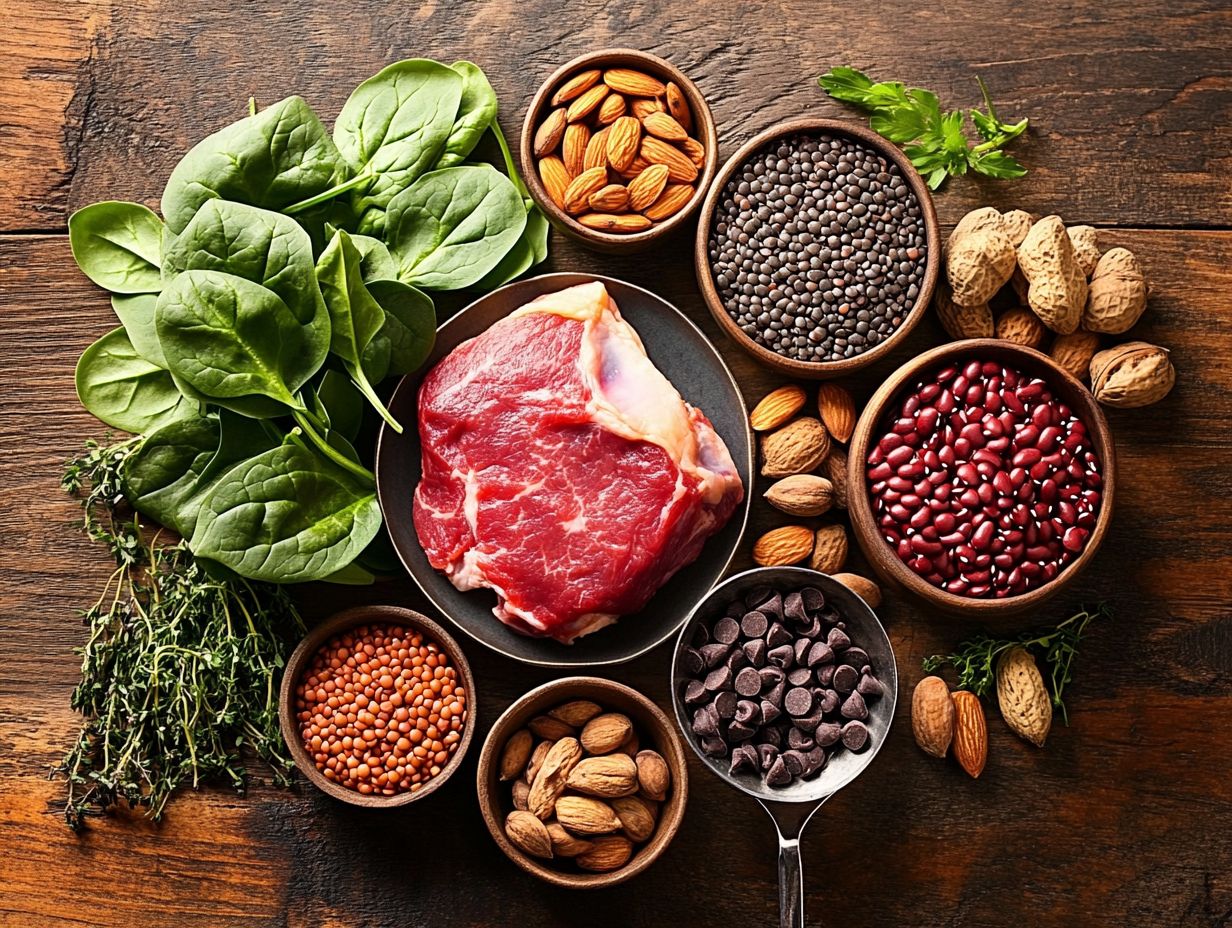
Iron is an essential mineral that plays a pivotal role in your body. It facilitates the formation of hemoglobin, which is critical for transporting oxygen in your red blood cells and bolstering a strong immune system.
Ensuring adequate iron levels is crucial for meeting your daily requirements, especially if you belong to higher-risk groups, such as pregnant women and growing children.
The Critical Role of Iron
Iron primarily facilitates the production of hemoglobin, which is crucial for forming red blood cells that carry oxygen throughout your system. This directly influences your energy levels and immune function.
This essential mineral significantly contributes to energy metabolism, supporting the conversion of food into usable energy. That makes it critical for your daily activities and overall vitality.
To ensure you re getting enough iron, focus on incorporating iron-rich foods into your diet, such as:
- Lean meats like chicken and turkey
- Beans
- Lentils
- Spinach
- Fortified cereals
Understanding your body’s specific iron requirements is fundamental. Deficiencies can lead to fatigue and a weakened immune response, highlighting just how important this nutrient is for promoting your overall health.
Start incorporating iron-rich foods into your meals today for a healthier tomorrow!
Top Iron-Rich Foods to Incorporate
Incorporating iron-rich foods into your diet is crucial for maintaining optimal iron levels. Boost your iron intake now to feel more energetic and vibrant!
You can categorize these foods into two types:
- Heme iron: Sourced from animal products like seafood and red meat.
- Non-heme iron: Commonly found in plant-based sources like leafy greens, legumes, and fortified cereals.
Meat and Seafood
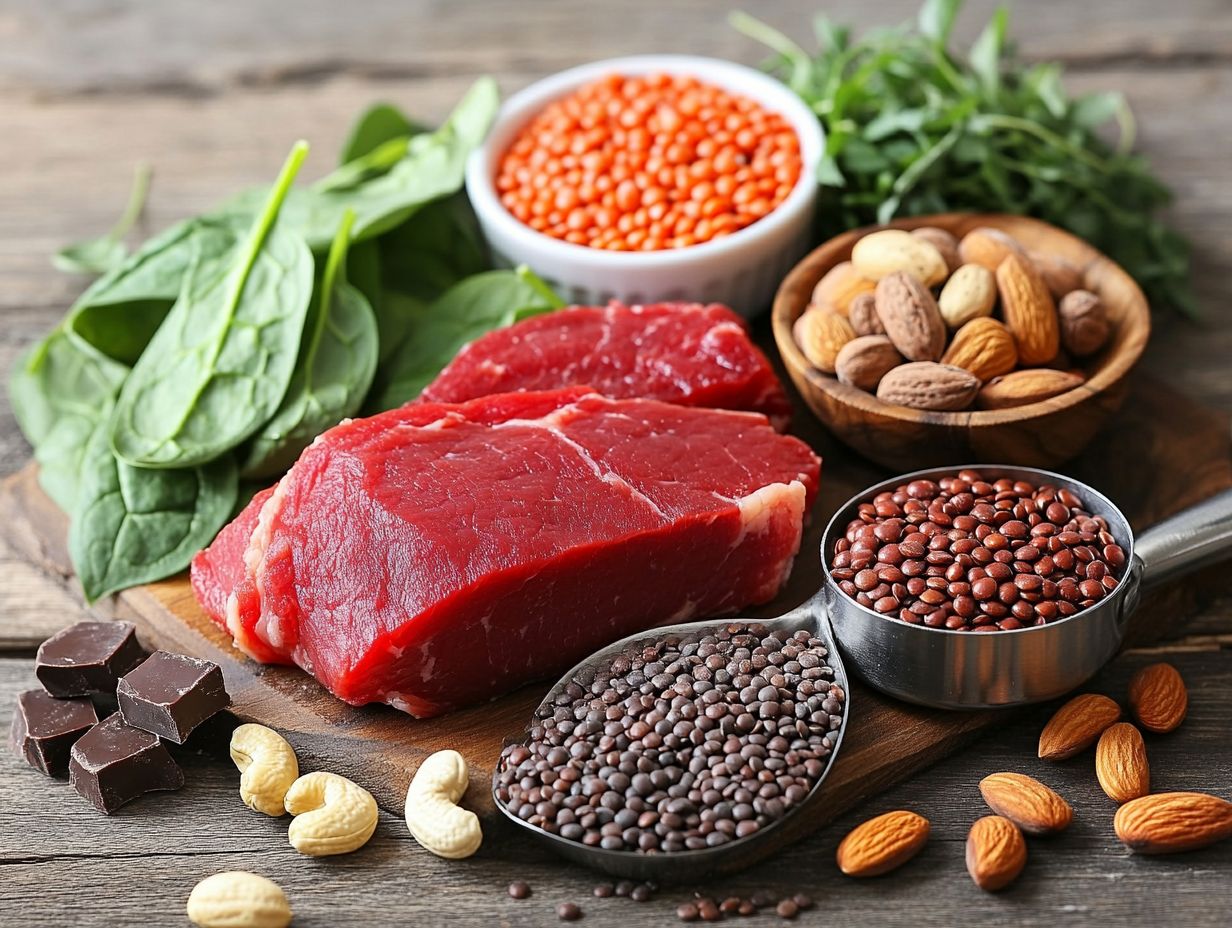
Meat and seafood are top sources of heme iron, which your body absorbs more efficiently than non-heme iron from plants.
When it comes to meat, options like beef, lamb, and liver are particularly rich in this essential mineral. Cuts such as sirloin and ribeye not only increase your iron levels but also provide a hearty dose of protein and vital nutrients, including B vitamins.
On the seafood front, indulging in clams, oysters, and sardines offers an exceptional boost, as they are rich in iron and packed with omega-3 fatty acids and micronutrients.
Incorporating these meats and seafood into your meals can significantly elevate your iron intake, enhancing your energy levels, supporting immune function, and contributing to your overall health.
Plant-based Sources
Plant-based sources of iron primarily include non-heme iron from diverse foods like leafy greens, legumes, and iron-rich fruits. These options provide essential health benefits, such as enhanced energy and improved immune function.
Keep in mind, your body doesn t absorb non-heme iron as well as heme iron. To increase absorption, pair these foods with vitamin C-rich options like citrus fruits or bell peppers; this simple addition can enhance your iron uptake.
Also, be mindful of factors that affect calcium absorption. Reducing the consumption of calcium-rich foods or caffeinated beverages during meals can optimize your body’s ability to utilize the non-heme iron you consume. Understanding these strategies is vital for anyone relying on a plant-based diet to meet their iron needs.
Tips for Increasing Iron Absorption
To get the most from your iron-rich foods, pair them with vitamin C sources. Implementing these dietary strategies can significantly enhance your absorption of iron.
Be mindful of factors that affect calcium absorption to optimize your intake effectively.
Combining Foods for Maximum Absorption
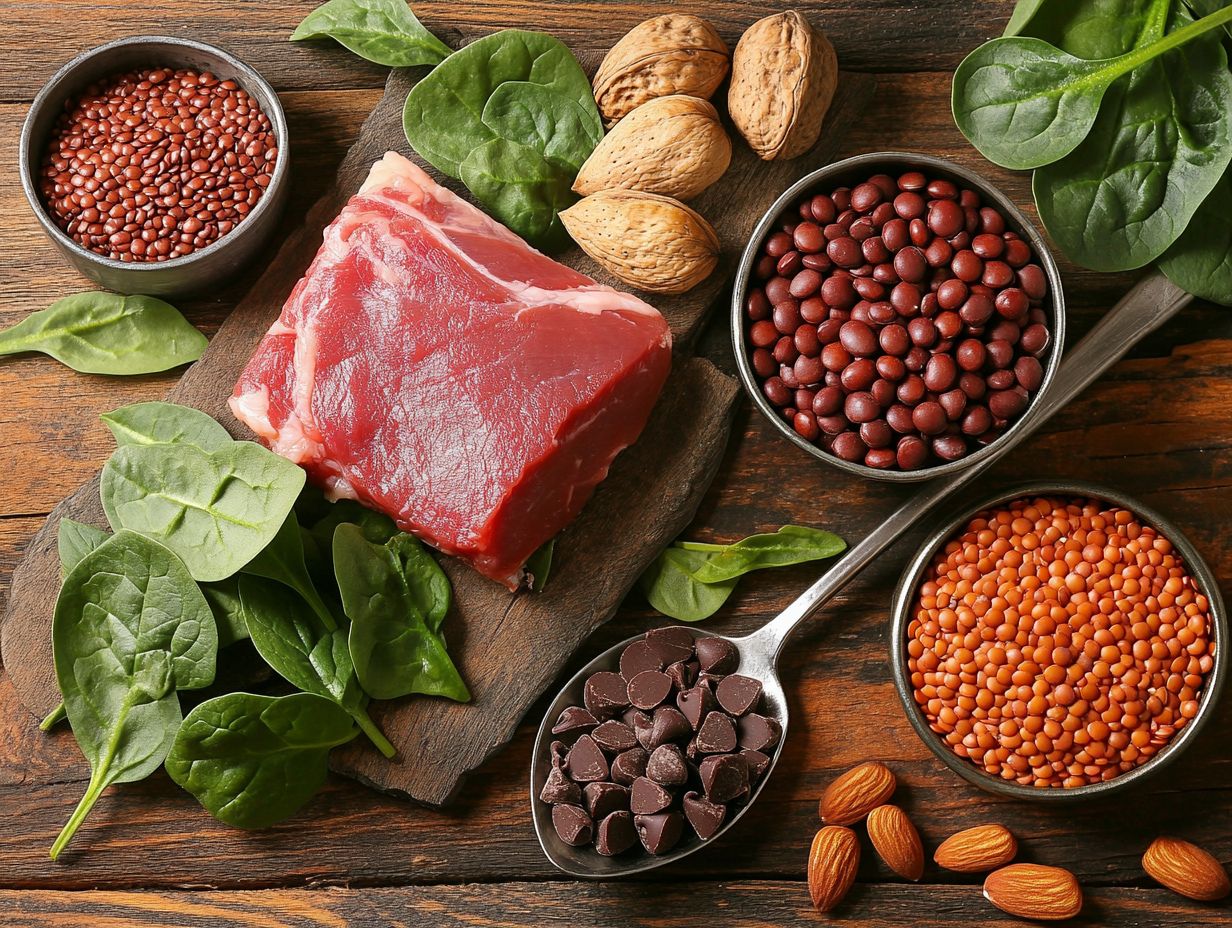
Combining iron-rich foods with sources of vitamin C can really boost your absorption. For instance, pairing spinach with citrus fruits or bell peppers maximizes nutrient benefits.
This strategic merging of ingredients elevates absorption rates and ensures you enjoy a balanced intake of essential vitamins and minerals. By adding legumes like lentils or chickpeas to salads with tomatoes, you can amplify this effect, creating meals that are both delicious and nutritionally complete.
When planning meals around iron sources like red meat or fortified cereals, complement them with fruits and vegetables high in vitamin C for optimal health.
Stay informed about dietary guidelines that emphasize the importance of diverse food combinations for enhancing iron uptake, contributing to a well-rounded and health-conscious eating strategy.
Supplements for Iron Deficiency
Iron supplements can be a valuable solution for anyone facing iron deficiency, especially if dietary intake from iron-rich foods falls short of meeting your body’s needs to prevent anemia. If you think you re lacking iron, talk to your doctor about supplements.
When to Consider Iron Supplements
If you have iron deficiency or anemia, iron supplements are essential, especially for pregnant women who need higher iron levels for their health and their child’s development.
People with heavy periods or gastrointestinal disorders may also be at risk for low iron levels. Symptoms of deficiency include fatigue, weakness, and pale skin, showing that the body struggles to produce enough hemoglobin for oxygen transport.
Healthcare professionals diagnose these conditions through blood tests and dietary assessments, ensuring appropriate strategies to manage iron levels.
Reputable institutions like the Cleveland Clinic recommend tailored supplementation plans to meet individual needs, promoting overall health and preventing complications associated with anemia.
Preventing Iron Deficiency
To prevent iron deficiency, embrace healthy habits and make informed dietary choices that include iron-rich foods.
By prioritizing these foods, you can effectively meet your daily iron requirements.
Healthy Habits and Dietary Changes
Incorporating healthy habits and dietary changes can greatly reduce your risk of nutritional deficiencies while maintaining optimal iron intake. Include a variety of iron-rich foods and follow dietary guidelines.
Be mindful of your iron sources. Prioritizing heme iron foods like lean red meats, poultry, and seafood ensures better absorption.
Don t forget non-heme iron sources like legumes, nuts, seeds, and fortified cereals to enhance overall intake. Pair these with vitamin C-rich fruits and vegetables, such as oranges and bell peppers, to boost iron absorption.
Limit calcium-rich foods during iron-rich meals to maximize absorption. These small adjustments can elevate your energy levels and improve your well-being.
Frequently Asked Questions
What are some important things to know about iron-rich foods and how to boost your intake?
Iron is essential for transporting oxygen and producing red blood cells. Here are key points for boosting your iron intake:
What are some common iron-rich foods?
Best sources of iron include:
- Red meat
- Poultry
- Seafood
- Beans
- Lentils
- Tofu
- Dark leafy greens
- Fortified cereals
- Dried fruits
How can I incorporate more iron-rich foods into my diet?
Add a variety of iron-rich foods to meals and snacks:
- Add spinach or beans to salads.
- Include grilled chicken or fish with meals.
- Snack on dried fruits and nuts.
Are there any foods that can hinder iron absorption?
Yes, certain foods can hinder absorption. Avoid consuming these with iron-rich foods:
- Calcium-rich foods like dairy products and fortified juices
- Tannins found in tea and coffee
Are there any lifestyle factors that can affect iron absorption?
Certain lifestyle factors can also affect absorption. Limit:
- Excessive alcohol consumption
- Tobacco use
- Certain medications
Consult your doctor if you have concerns.
What are some signs of iron deficiency, and when should I consult a doctor?
Common signs include:
- Fatigue
- Weakness
- Dizziness
- Pale skin
- Shortness of breath
If you notice these symptoms, consult a doctor for proper diagnosis and treatment. They may recommend dietary changes or iron supplements to help boost your intake.

